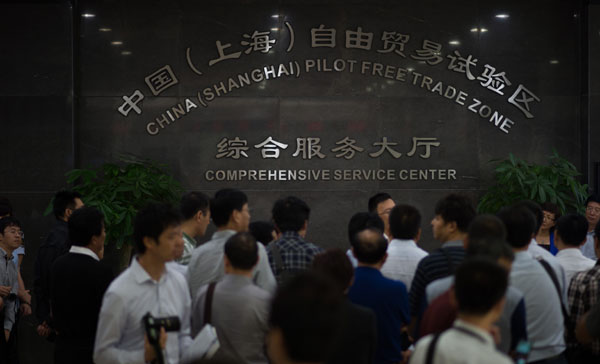Case open: Foreign law firms to get more access via FTZ
Chinese law firms and their overseas counterparts will be allowed to cooperate on international legal cases in the China (Shanghai) Pilot Free Trade Zone, as part of the process of opening up the country's legal services market.
On Tuesday, the Shanghai government announced measures on mutual accreditation of lawyers between Chinese and foreign law firms located in the FTZ and on cooperative arrangements for domestic and foreign law firms.
At present, the representative offices of foreign law firms in China may only offer information on China's legal environment.
|
People wait at the comprehensive service center of the China (Shanghai) Pilot Free Trade Zone. Chinese law firms and their overseas counterparts will be allowed to cooperate on international legal cases in the zone. AFP |
They may not litigate cases or employ Chinese lawyers.
Previously, law firms based in Hong Kong and Macao were allowed to cooperate with mainland law firms under the Closer Economic Partnership Arrangement, which covers the two special administrative regions and their relationship with the Chinese mainland.
Now such cooperative agreements will be allowed for other qualified overseas law firms.
"With China's economic growth and its increasing integration with the world, the demand for cross-border legal services is rising," said Tao Jingzhou, managing partner of DechertLLP's Asia practice in Beijing.
Opening up legal services is one of the key reforms taking place in the FTZ. Under its master plan, the zone will "explore mechanisms for Chinese law firms to cooperate with their overseas (including Taiwan, Hong Kong and Macao) counterparts ".
According to the measures just announced by Shanghai government, Chinese law firms can assign lawyers to the representative offices of foreign law firms in China as "China legal affairs advisers".
In return, foreign law firms can delegate foreign lawyers to Chinese law firms or branches as "foreign legal affairs advisers".
The firms involved will determine what cases to handle and how labor is to be divided.
Domestic and foreign law firms should cooperate within the FTZ in line with the rights and obligations stipulated in their agreements.
The parties may provide Chinese and foreign clients with legal services specific to each country involved, or they may work together to deal with cross-border and international legal affairs.
Each law firm will independently maintain its legal status, name and financial management, and it must bear any civil liabilities independently, the regulations state.
Cooperating firms may share office space, equipment and support staff such as secretaries.
Shared offices should be in the premises of the Chinese law firms or their branches in the FTZ, or in the Shanghai representative offices of foreign law firms that establish a presence in the FTZ.
wanghongyi@chinadaily.com.cn



















